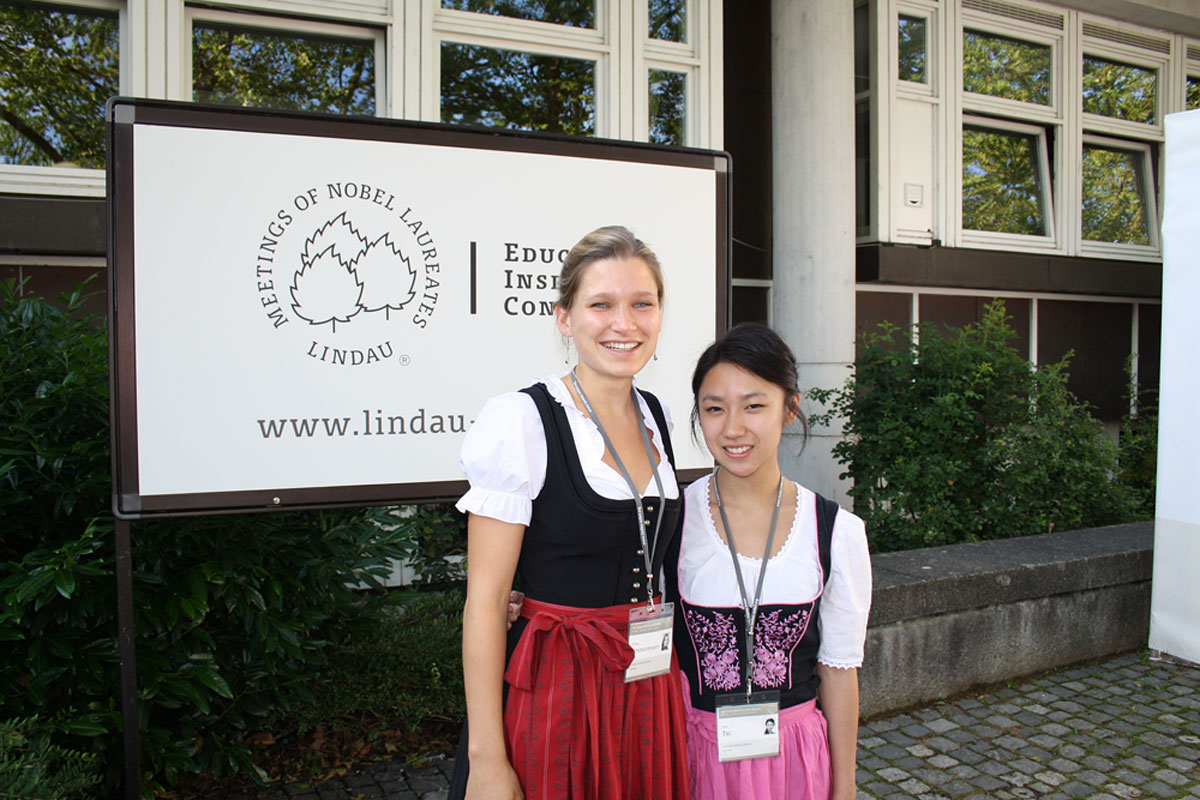A TUM-student at a meeting of Nobel Prize laureates:
"Stay curious, like a child"

Hello, Ms. Zimmermann. You visited the Nobel Laureate Meeting in Lindau recently. How was it?
Quite impressive. At first I was a little nervous about meeting so many Nobel Prize winners at once – but that settled soon. We had a tight schedule: In the morning, there were short plenary lectures held by the prize winners, 30 minutes each. In the afternoon, they could be met in small discussion rounds where you could get to know them more closely.
How did the Nobel laureates present themselves?
The ways the Nobel laureates held their lectures differed. Some talked about their research, while others focused more on science and its general role in society. In the afternoon discussions, you could ask them just about anything – straightforward. That was especially interesting for me. Their research is well known – or can be looked up – but this was an opportunity to ask more personal questions.
What could be learned from the Nobel laureates, beyond their research results?
For example, I asked Gerhard Ertl (Note: German physicist, NP 2007) if he ever had doubts about his scientific career. Not really, he replied – and gave an overview of his career path. He was awarded for his findings in surface chemistry. He told us that he ended up in this field of science quite by chance: He had already found a working group, but did not really want to work in the field of electrochemistry, which they focused on. So he just changed to the surface chemistry, and it became his area of expertise. We found that quite amusing.
Who impressed you most?
For example, I was really impressed by Steven Chu (American physicist, NP 1997, and the energy minister of the current US-government) and Harold Kroto (British chemist, NP 1996). They explained what they expect of researchers and their work, which I personally found more interesting than the subject-specific lectures. Kroto and Dan Shechtman (Israeli physicist, NP 2011) were very inspiring. They could really get across how much fun they have with their research and with explaining science.
Surely the Nobel laureates are very inspiring...
One statement from Harold Kroto which I thought to be particularly amusing was that he said he was able to play all his life – and to stay curious, like a child. As discoveries often occur by chance, he just remained alert and focused on coherences. Clearly, it is very important to be open.
Not only the Nobel Prize laureates come to Lindau, but also 600 young people from almost 80 countries.
The atmosphere was great and everyone was incredibly open. I got a lot of ideas for my field of science and could make useful contacts. I was especially happy about the fact that there was no group formation. During the whole event, you could join in anywhere at any time and could always take part in the conversation. At the Bavarian evening, everyone was invited to dress in his or her country’s traditional costume. That was a colourful picture and a lot of fun.
How did you get to join the Nobel laureates' meeting?
I have a scholarship of the Max Weber Program of the Elitenetzwerk Bayern, by which I was nominated. A committee in Lindau assigns the places. Physically, I got there by train. There were five of us from the TUM and we shared a Bayern Ticket.
In autumn, you will start your doctoral studies, so you're staying in the field of research. What are you take from Lindau for your future work?
Great motivation! My conclusion is that the Nobel laureates started off as "normal" researchers who really enjoy their work – perhaps a little more than most others. This is why it is not a big issue if their laboratory work doesn’t come out too well for a while. Many of the winners I spoke to have another passion apart from Chemistry: a musical instrument or painting for instance – and they often emphasize how important these things are for them. That is an encouragement to take time for such things.
Teresa Zimmerman, age 23, is from Passau. She has just completed her master's degree in Chemistry at the TUM. Her Master’s Thesis focuses on the immobilization of catalysts for the production of certain monomers. Starting in autumn, Teresa Zimmermann will take up her doctoral studies at the Department for Inorganic Chemistry at TUM Garching.
(Interview: Verena Meinecke)
- Read more about the 2013 Nobel Laureate Meeting